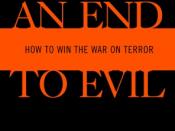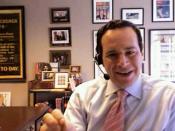As the war in Iraq elevated, more and more people became involved in the discussion of what was the best way to end evil. Among them David Frum and Richard Perle are the representatives of hard-liners. They argue in their book An End to Evil: How to Win the War on Terror that America should adopt a tough policy when dealing with international relationships. They regard all those countries that have the potential to threaten America or to not support America as their enemies. In their opinion, dialogue, negotiation and compromise are not "realistic" or "pragmatic" and could not solve any problem, and only hardline can bring and end to evil.
Thomas Powers, however, expresses something different in his Tomorrow the World, a review on An End to Evil: How to Win the War on Terror. Generally speaking, the author is quite objective in this review and presents us a lot of facts without much personal emotion, but we can still sense his disapprovement of the "hardline" advocated by Frum and Perle.
Powers writes, "treating Hezbollah and Hamas as synonymous with al-Qaeda", as is supported by Perle, actually "widens the war on terror without making it easier to fight". Therefore, as the fighting becomes more and more fierce and complex, the goal of peace seems to be more and more difficult to reach. Also on the issue of resolving the conflict between Israle and Palastine, Perle "a bleak outline of everything that won't work". It seems that Perle is the one who is not realistic or pragmatic at last. Powers's review conveys to us such information that Perle has been a hard-liner ever since he stepped onto the political stage in the 1960s. His toughness seems to be inborn and he is always biased towards those countries like Palastine,


